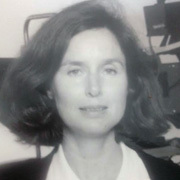
Colleen Hodge
After growing up in Whanganui and attending Victoria University, Colleen Hodge’s start in television coincided with the launch of the second channel in 1975. "It was an exciting time to work in television," says the researcher turned producer. "Lots of talent and creative freedom — and the feeling that the product was actually central to people's lives."
Hodge started off on Encounter, a Sunday night documentary series exploring “people, places, and life in New Zealand today”. While there she researched an episode (directed by Paul Leach) based on interviews with New Zealand veterans of the Spanish Civil War, both male and female. "I think we even identified one or two from the fascist side, but most were republican.” She also met fellow researchers Liz Greenslade and Julienne Stretton, who she would work with again. Encounter would go on to become Perspective.
In the late 1970s Hodge was a researcher and production assistant on Ted Morrisby's big budget series Castaways for South Pacific Television, which retold tales of real life shipwrecks and lost survivors in the Pacific. She has especially fond memories of the 'Boy Chief of Tonga' episode, based on Brit William Mariner, whose ship was seized off an island in the Ha'apai group. "His shipmates were all killed, but the chief allowed Will his life and he lived as a native for several years, assuming some sort of power.”
Around this time Hodge got married and moved to Papua New Guinea, taking a break from television. Upon returning to New Zealand in the early 1980s she co-founded research company Bluestockings, alongside Greenslade, Stretton and Diane Musgrave.
The company’s first assignment was to track down and interview all the veterans of Gallipoli living in New Zealand, 25 of whom were interviewed on camera. All were in their 80s or 90s. The completed research was given to writer Maurice Shadbolt and director Doc Williams, who in partnership with war historian Chris Pugsley made documentary Gallipoli: The New Zealand Story. It won the 1985 Feltex Award for Best Documentary. The Bluestockings team also worked on live chat show The Tonight Show, presented live by Catherine Saunders.
In the mid 80s Hodge began in the TVNZ newsroom as a researcher and producer on contract. She remembers a special partnership with Carol Archie, "who came up with the idea to compare treaties and settlements in New Zealand with the Native American experience.” Hodge and Archie would file four stories during their North American trip.
In the 1990s Hodge began to shift her focus towards the topic of disability, starting with Miles Turns 21. With encouragement from the documentary's director Julienne Stretton, Hodge set up production company Miranda Productions, which later became Colleen Hodge Productions. The documentary follows Miles Roelants, a young man with spina bifida, as he turns 21 years old and travels to Los Angeles to meet his hero, actor Michael J Fox, a year before Fox was diagnosed with Parkinson’s disease.
Also featured was young Shelly West, who was keen to travel to Italy despite being blind and suffering from rheumatoid arthritis. Hodge made another documentary on the pair when they went flatting together in 1993: Miles and Shelly Go Flatting won a Gold Medal at the 1994 New York Festival. Hodge and Stretton continued their observational series, following Shelly on two more documentaries: Shelly Has a Baby and Mum, Dad and Michela. All rated highly and helped provoke nationwide conversation about the right of disabled people to live ‘normal’ lives.
During the 1990s Hodge also produced a handful of other documentaries. In 1991 she worked with Steve La Hood and Rawiri Paratene on Opo, about the beloved dolphin that began inhabiting Hokianga Harbour in 1955. In 1992 she produced the Bill Saunders-directed documentary Over Here, about US servicemen in NZ during World War II. She also produced Once a Convent Girl, directed by Melanie Rodriga, which focused on Catholic convent girls’ schools in New Zealand — and the unique experience of growing up in one, something Hodge had firsthand knowledge of.
Hodge worked with Julienne Stretton again in 2003, to make the Our New Zealand series, which explored New Zealanders’ connection to the country’s landscape.
Hodge now lives in Auckland and London.
Profile written by Simon Smith
Sources include
Colleen Hodge
Diane Musgrave
Robert Boyd-Bell, New Zealand Television - The First 25 Years (Auckland: Reed Methuen Publishers, 1985)
Paul Ward, 'Julienne Stretton' NZ On Screen Website. Loaded 31 May 2016. Accessed 29 November 2016